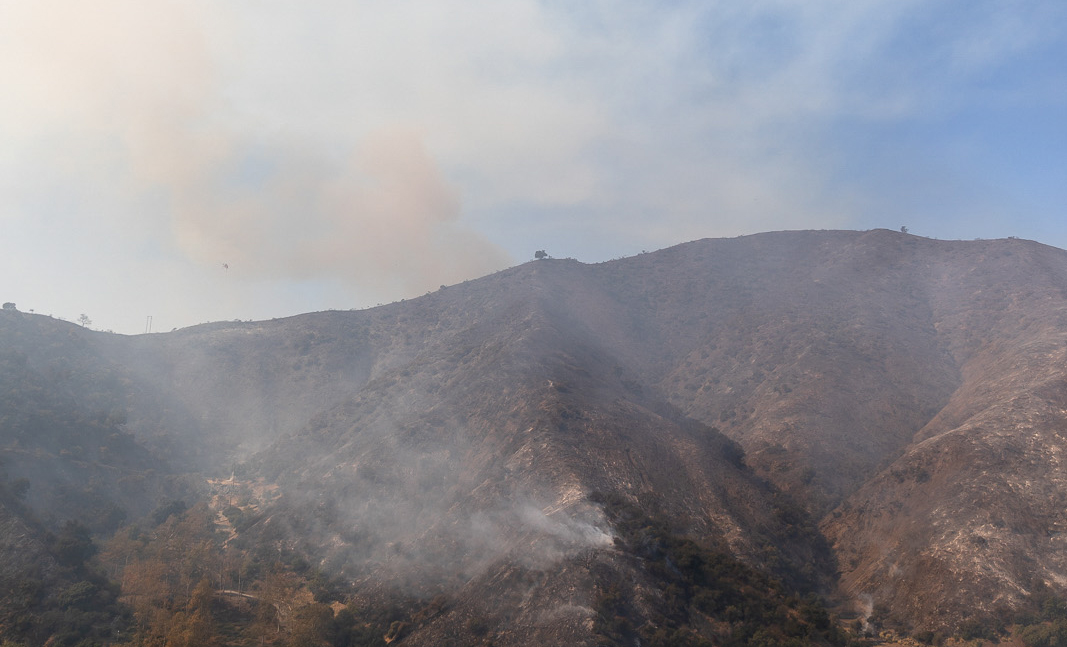Op-ed: UCLA could have done more to protect student, staff safety during Getty fire

The handling of communications about the Getty fire from the chancellor’s office was disingenuous and disregarding of student and employee safety. News reports and climate forecasts told a different story from the updates that came from the chancellor’s office.(Tanmay Shankar/Assistant Photo editor)
I am a graduate student who was concerned with the messaging regarding the recent fires that was sent to students and staff this past week.
While I appreciated the live updates regarding the statuses of the fires as well as the traffic and air quality on and surrounding campus, it was alarming to me that the approach to these updates seemed to be day-by-day as opposed to holistic.
The university seemed to be ignoring urgent forecasts that revealed the winds and fires to have been escalating this past week, and prioritizing first and foremost the imperative that individuals come to work so the flow of capital and labor within the university was as minimally impacted as possible.
For all of the rhetoric released from the chancellor’s office, such an approach does not seem to indicate a Bruin “community” so much as a disposable and devalued collective of workers expected to ignore valid health, safety and traffic concerns at a moment’s notice in order to ensure the university continues to turn a profit.
It was not safety, but rather liability, that seemed to be upheld in this instance. To what extent are conditions stable enough for the university to urge individuals to come to work without incurring direct accountability for any natural disaster-related incidents that may have transpired? This seemed to be the underlying motive behind such calculations.
It was also disturbing to note the relative disparity between the news and climatological forecasts and the sunny updates that were issued from the chancellor’s office. The fires’ proximity to the 405 Freeway is only one dimension in a much larger constellation of risks to which I believe we’re exposed. The location of fires was not the sole determinant in this instance, given that the wildfire season’s risks are also concerned with how fires interact with and may be exacerbated or spread by the raging Santa Ana winds – as well as weather conditions such as low humidity that can act as a catalyst.
But even regarding a “liability-oriented” calculus, such tactics are sharply short-sighted. Are we really to believe that we should have continued requiring our students to attend courses when prospects seemed unclear at best and foreboding at worst? The university doesn’t seem to be grooming us to be authentic stewards of student welfare and safety with such an approach.
Some of us graduate students have been dealing with students who were directly impacted by the fires or even facing relocation. In such critical moments, it is incumbent upon all of us to step back and reassess what is truly important. Even if forecasts were as uncertain as the jarring quality of university messaging indicated, this remains an insufficiently compelling reason to simply assume that all is well until further notice.
As students and employees, we deserve nothing less than an optimally safe working environment and the right to prioritize our health and well-being when such an environment is put into question. The university ought to respect this by granting all of us transparent safety assessments culled from plausible weekly forecasts – holistic assessments compared to the day-by-day updates that maximize the prospect of graduate student labor. It was demoralizing to see that, from the administration’s office to departmental and professorial conduct and messaging, the sentiment seemed to be one of nervous groupthink. Many automatically deferred to the immediate declarations of university administration rather than relying on common sense and human compassion to dictate next steps regarding arrangements.
Some might argue BruinAlert updates did precisely this by using recommendations for students and staff to put “safety first” in deciding whether or not to come to campus, but such a statement is utterly cosmetic. It is appealing on the surface but devoid of any actionable substance.
In fact, these sentiments had precisely the opposite effect. My own interactions with various representatives of the campus community – administrative officials, professors and students – suggested that people felt more compelled to come to campus because the university hadn’t declared an official shutdown. Concern about the fires beyond what was suggested in the updates was thus transformed into a personal issue.
Liability had outsourced safety into an individual responsibility rather than an institutional prerogative. The most insidious part of all of this is that there is nothing the university had technically done wrong. And beyond that robotically checked box of technicality swarmed all of the anxieties that had to be swallowed because of concern about vocational and educational standing.
The net effect of this status quo seems to reflect the instrumentalization and truncation of climate science so as to maximize profit and public image at all costs. This may be unsurprising, given how the most intense impacts of natural disasters of the fires are most intensely felt by all subjected to various forms of class, labor, gendered, sexual or racial oppression and exploitation, but it makes it no less disheartening.
I am unsure if the university will reverse course on these tactics in the future, but at the very least I hope that bringing this to larger attention can help promote an important conversation about the devaluing of safety and well-being for the interests of an increasingly corporatized neoliberal university system.
Omar Zahzah is a Ph.D. candidate in comparative literature as well as a member of the Palestinian Youth Movement and Graduate Students for Justice in Palestine at UCLA.


